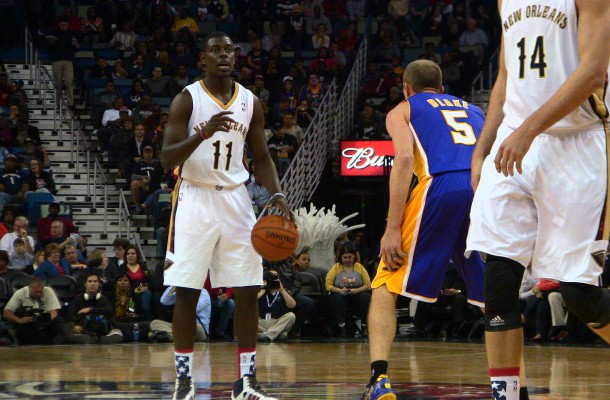« New Orleans Pelicans Announce D-League Franchise
In the NO Pod Ep 282: Optimism Warranted? »
Prioritizing identity for the sake of identity

What is in an identity? Much like within an individual, the identity of an organization takes on its shape over time. It is up to the constituents of that body to decide if its identity will be influenced more by external forces or internal ones. Do we trust the instincts of our leadership enough to sacrifice ourselves for them, or are there reservations within that prevent us from walking all the way down the plank? For the New Orleans Pelicans, this push-pull has been a tremendously impactful part of the process of constructing an identity. Both on the court and off, it’s often very difficult to identify the direction of the franchise.
Setting aside the mess at the head of the front office, other concerns are just as glaring. The Pelicans have stuck with their stigmatized medical staff far past its half life, and have paid in missed games. Their desperate free agency strategy is made more costly by the coaching staff’s struggle to develop young talent. Head coach Alvin Gentry’s job is far from guaranteed heading into his third summer in New Orleans. And above all, the on-court product is disjointed.
The style and production of the players on the court is the principal generator of interest (and, in turn, revenue) for a basketball team. Making concrete the style and goals of the team should be priority number one. This idea is the reason so many fans were troubled throughout the first two-thirds of the season when team officials popped up publicly only to discuss how desperate they all were to find an on-court identity. Management provided them a deep group of defense-first young veterans, yet the coaches were unable to lean far enough in any direction to build off of a specific set of skills.
The Pelicans stumbled into a top-ten defense through the first month or so of the year, which was puzzling. Though Anthony Davis was heralded as a top-flight rim protector coming out of Lexington, his defense had yet to truly expand past that point in the NBA before this year. It was unclear if Solomon Hill, Dante Cunningham or E’Twaun Moore was ready to hold tight at the point of attack in front of a discombobulated frontcourt rotation. The team’s second fiddle, Jrue Holiday, had plenty of defensive struggles of his own to manage before considering the rest of his team. Before the year, the shrug emoticon would probably have served as the best answer for if and how the Pelicans would play defense this season.
Yet here we are, with about a week left in the year, and the Pelicans remain sixth in defensive efficiency. This number, which measures points allowed per 100 possessions, is the team’s best since 2012. New additions on the wing have been able to lead an aggressive switching scheme, which puts less pressure on the back line. It also maximizes the length of players like Holiday and Moore, who can disrupt players several inches taller than them, with extra physicality and arm-waving.
Now, with DeMarcus Cousins in town, it will have to be re-imagined. The strongest advantage a huge team like New Orleans has is on defense. Think of the teams that have continued to succeed into this new era– they all go to great lengths to prevent shots and alter the ones that opponents do take. They mitigate the effects of a less dynamic offense by balling out on defense– Memphis and San Antonio especially come to mind.
Those are the first- and seventh-best defenses in the NBA this year, while on the other side of the ball, the Grizzlies and Spurs rank seventh and 18th.
Since acquiring DeMarcus Cousins, the Pelicans have indeed doubled down on their defensive identity, even as they struggle to develop an offense centered around two 7-footers. Cousins and Davis are both versatile enough to handle various assignments on D, one corralling smaller players while the other protects the paint down low. Then, passing off the assignment to the next guy, telepathically.
Moore, Hill, Cunningham and the rest deserve mountains of credit for keeping guys in front of them and igniting transition opportunities. They are the team’s most valuable defenders. Herein lies the rub: Number the defensive MVPs on the New Orleans roster, and in most cases you’re also tabbing the team’s least valuable offensive players. Two-way is a no way for the Pelicans.
This is fine– it’s an opportunity for the front office this summer. But digging in on defense and winning games in the 80s is not only unglamorous, it’s exhausting. Dominating the glass, protecting the rim, and controlling playmakers is arguably more intensive than the most aggressive offensive blitzkriegs. Can two superstar scorers buy in? Is Alvin Gentry the coach to unlock it?
Everything in the Pelicans’ orbit this summer will be focused on the decisions to be made on Gentry and Holiday. It will determine the financial future of the team, as well as the sort of group they’ll be on the court. All arrows are pointing toward the defense today, but take those two out of the equation and it’s hard to tell what this all looks like. That dilemma in and of itself is reason enough to make the argument that retaining both is the easiest path.
If they do, the insurance provided by consistency and chemistry would be the best the Pelicans have had in ages. Top-down congruity like this would sure be a great place to start.




